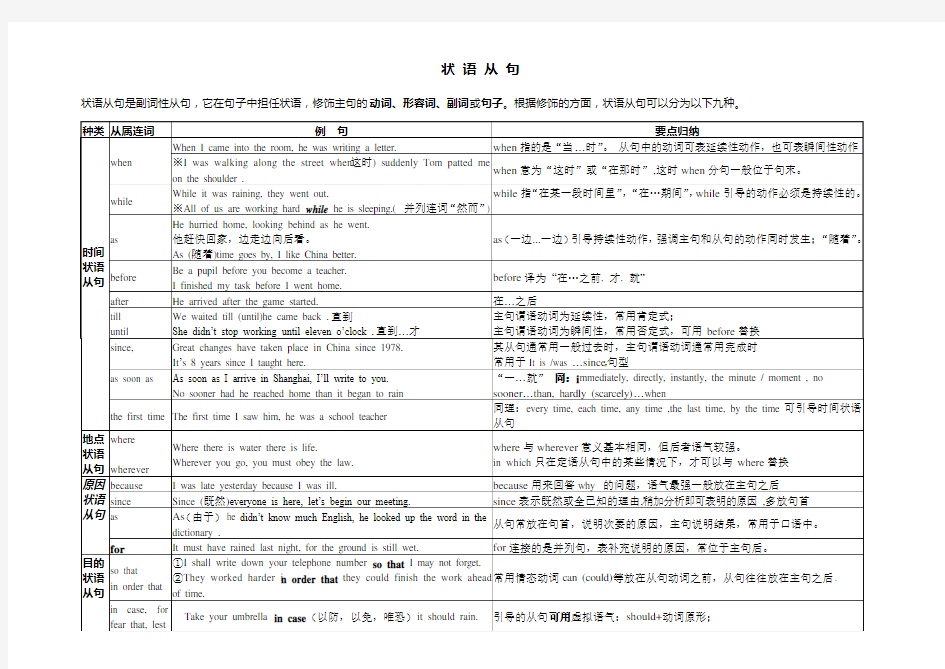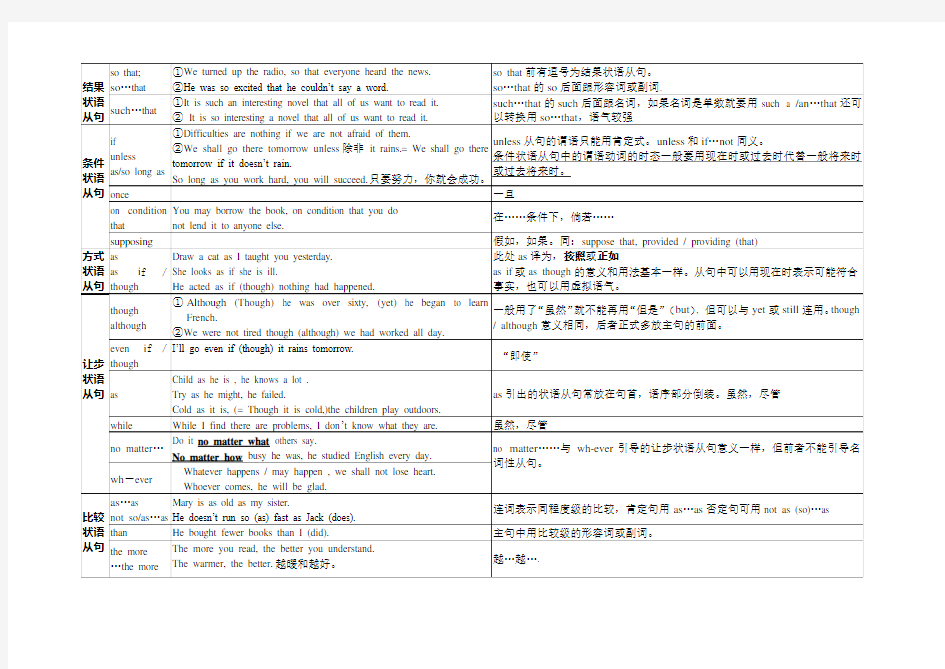

状语从句
状语从句是副词性从句,它在句子中担任状语,修饰主句的动词、形容词、副词或句子。根据修饰的方面,状语从句可以分为以下九种。
since
英语中的九大状语从句 状语从句在主从复合句中修饰主句中的动词、形容词或副词等,按意义可以分为时间、地点、原因、目的、结果、条件、方式、比较、让步等状语从句。 一.时间状语从句。 通常由从属连词when, whenever, as, while, before, after, as soon as, till, until, since, once (一旦), hardly……when…, no sooner…….than…; 等引导。例如: The cyclist started just as the lights changed to green. Whenever we met with difficulties , they cam to help us. He didn’t leave his office until he had finished the day’s work. 应注意的问题 1.在时间状语从句中,通常要用动词的一般现在时态表示一般将来时态,用一般过去时态表示过去将来时态。但when 引导一般疑问句或名词性从句时不受上述语法规则的限制,因此,应该加以区分。例如: When China will enter WTO depends on the bilateral (双边的)joint efforts. Once you understand the rules of the game, you’ll enjoy it. 2.when , while, as 的不同用法。一般说来,当主、从句的动作是同时发生的事,三者可以换用。when 既可以引导一个持续动作,也可以引导一个短暂动作,可用于主句和从句动作同时发生或从句动作先于主句动作;while 引导的动作必须是持续性的,强调主句和从句的动作同时发生,往往侧重主句和从句动作的对比;as 用于引导“在某行为的继续中发生某事”的“继续之行为”,所以多与过去进行时连用,翻译成“一边……一边……”或者表示动作的变化,翻译成“随着……”。 例如: I hope you’ll think of my words as/when/while you drive on the busy roads. When he realized it, the chance had been lost. When he came home, I was cooking dinner. I was fat when I was a child. He took a bath while I was preparing dinner. As I was walking down the street, an American asked me for the directions to the nearest station. He sang songs as he was taking a bath. As he gets older he gets more optimistic.
表格“话”状语从句 状语从句是在复合句中充当状语,用来修饰谓语动词、形容词和副词的句子。状语从句按其意义和作用可以分为时间、地点、原因、条件、结果、方式、让步状语从句等。在高考中主要考查一下几个方面: ①引导状语从句的从属连词; ②主从句的时态、语态; ③与其他从句和句型的区别; ④从句中的省略。 考点例析 1.___________ the Internet is bridging the distance between people, it may also be breaking some homes or will cause other family problems. 2. The cost of living in Glasgow is among the lowest in Britain, _________ the quality of life is probably one of the highest. 3. It was not until near the end of the letter ________ she mentioned her own plan. 4. One Friday, we were packing to leave for a weekend away ________ my daughter heard cries for help. 5. I have heard a lot of good things about you _________ I came back from abroad. 6. ________ I really don’t like art, I find his work impressive. 7. You must learn to consult your feelings and your reasons _________ you reach any decision.
英语语法专项之状语从句 1. 时间状语从句 2. 条件状语从句 3. 原因状语从句 4. 结果状语从句 5. 比较状语从句 6. 目的状语从句 7. 让步状语从句 8. 地点状语从句 用来修饰主句中的动词,副词和形容词的从句叫状语从句。根据其含义状语从句可分为时间状语从句,地点状语从句,条件状语从句,原因状语从句,结果状语从句,比较状语从句,目的状语从句,让步状语从句。 各类状语从句连接词(短语)一览表: 时间 when, while, as, as soon as, since, until, after, before,as long as(长达……之久)条件 If, unless,as/so long as(只要) 原因 As, because, since,as/so long as(既然,因为) 地点 Where 目的 So that(为了), in order that 结果 So that(方便), so…that, such…that 让 步 though, although, even if, however 方式 As 比较 than, (not)as…as 1. 时间状语从句 时间状语从句常见的从属连词有:(注意其汉语意义) when, while, as, before, after, since, until (till) once as soon as, the moment, the minute, immediately, directly, each/every time, the first time, the last time, next time, by the time, whenever等。例如: Every/Each time I was in trouble, he would come to my help. I thought her nice and honest the first time I met her. 注意:(1)when, while, as的区别: 1)when引导从句时,主从句的动作有先有后,也可以同时进行,从句的动作可以是持续性的,也可以是短暂的。如: When I got to the airport, the plane had already taken off. (主先从后)(短暂性) When I lived there, I used to go to the seaside on Sundays. (同时) (持续性)When the movie ended, the people went back. (从先主后) 2)while侧重主从句动作的对比,且从句的动词必须是持续性的。如: While we were chatting she was looking at the time table on the wall. 3)as引导从句时侧重主从句动作同时或几乎同时进行,从句的动作可以是持续性的,也可以是短暂的。如: Sometimes I watch TV as I am having breakfast. 4)when和while还可以是并列连词,意思分别是“就在这时”,“然而”。
状语从句 状从句是副性从句,它在句子中担任状,修主句的、形容、副或句子。根据修的方面,状从句可以分以下九种。 1、时间状语从句4、目的状语从句7、方式状语从句种从属 2、地点状语从句 3、原因状语从句5、结果状语从句6、条件状语从句8、让步状语从句9、比较状语从句 例句明 when whenever 状 从比较 并列 句 when When I came into the room, he was writing a letter. 当我屋,他正在写信。 We shall go there whenever we are free. 我什么有空,我就去那里。 I was walking along the street when suddenly someone patted me on the shoulder from behind. 我正在街上走着,忽然有人从后面 拍我的肩膀。 when 指的是“某一具体 的”。 whenever 指的是“在任何一个 不具体的”。 when 意“ ”或“在那 个候” ,可以看作是并列句 , 种用法的 when 分句 一般位于句末。 while as before While it was raining, they went out. 天下雨的候,他出去了。 I stayed while he was away. 他不在的候我在。 All of us are working hard while he is sleeping.( 然而:并列 ) He hurried home, looking behind as he went. 他赶快回家,一走一向后看。As time goes by, I like China better. 随着的流逝,我越来越喜中国。 Be a pupil before you become a teacher. 先做学生,再做先生。 I finished my task before I went home. 我做完作才回家。 while 指“在某一段 里”,“在?期”, while 引的作 必是持性的。 as(一 ...一)引持性作,主句 和从句的作同 生;随着。 before“在?之前,才, 就” after till until He arrived after the game started. 比开始后,他到了。 We waited till (until)he came back . 我一直等到他回来。 如主句是持性作,常She didn ’stop working until eleven 用肯定式,表示“直到? o’ clock . 止”;如主句是瞬 她到11 点才停止工作。 of sight, she ,要用否定式,表示“直?Until he had passed out stood there. 才”“在?以前不” ,从句放 她站在那里看着,直到看不他的身在句首表示,一般用until 影。 Great changes have taken place in China 主句持性的,从句 since 1978. 瞬的。 since 自从 1978 年以来中国生了巨大的 状从句在主句之前一般用化。逗号与主句分开,如从句在主 句之后不必用点符号。 as soon as As soon as I arrive in Shanghai, I ’ ll write hardly ? when 和 no sooner ? hardly ? when to you. 我一到上海就你写信。I had than 的意相当于 as soon as, no sooner?than hardly got home when it began to rain. 但只表示去生的事情,主 the moment, 我一到家,就下雨了。 =Hardly had I 句去完成,从句去
状语从句 状语是用来修饰动、形、副词的句子成分。由副词,介词短语,分词,分词短语,不定式,从句来充当。可以表示地点,时间(伴随),原因,目的,结果,条件,让步,程度,方式,比较。位置可在句首、中、末。 状语从句--------- ●时间状语从句:when, while, as, before, after, since, till, until, by the time, as soon as, once, immediately, directly, instantly, the moment, the minute, the time, the day, each time, every time, any time, on doing sth, on one’s+ noun., no sooner…than, hardly…when, scarcely…when, ●地点状语从句:where, wherever, ●原因状语从句:because, since, as, now(that), seeing that, considering that, in that, for, ●目的状语从句:so, so that, in order that, in case, for fear that, lest ●结果状语从句:so, so…that…, such…that… ●条件状语从句:if, unless, as long as, so long as, in case, if only ●方式状语从句:as, (just) as…so, as if / as though ●让步状语从句:though, although, as, even if, even though, whether, while, whoever, whatever, whichever, whenever, wherever, however, no matter who/ what/ which/ when/ where/ how,
状语从句是副词性从句,它在句子中担任状语,修饰主句的动词、形容词、副词或
状语从句although ②We were not tired though (although) we had worked all day. 以与yet或still连用。though / although意义相同,用法基本一 样,前者通俗、口语化,后者 正式多放主句的前面。 even i f/ though I’ll go even if (though) it rains tomorrow.even if 和even though的意思 为“即使”多用于书面语中。as Child as he is , he knows a lot . Cold as it is, (= Though it is cold,)the children play outdoors. as引出的状语从句多用于书面 语,它比用though或although 引导的从句,语气强,更有表 现力,从句常放在句首,语序 部分倒装。 no matter (who, what when,how …) Do it no matter what不管什么others say. No matter how无论多么busy he was, he studied English every day. no matter……与who-ever引导 的让步状语从句意义基本一 样,no matter……引导的从句可 是以位于主句前或主句后。wh-ever (whatever whoever …) Whatever happens / may happen , we shall not lose heart. Whoever comes, he will be welcome. 比较状语从句as…as not so/as…as Mary is as old as my sister. He doesn’t run so (as) fast as Jack (does). 连词表示同程度级的比较,肯 定句用as…as否定句可用not as (so)…as than He bought fewer books than I (did). He runs less fast than me. 表示不同程度之比较,主句中 用比较级的形容词或副词。 the more …the more The more you read, the better you understand. The harder you work, the greater progress you will make. The sooner, the better.越快越好。 The warmer, the better.越暖和越好。 意思为越…越…,通常的语序 为从句在前主句在后,这两个 the都是表示程度的副词,用在 比较级的形容词或副词前面。 句子意思明显,句子的主语和 动词都可省略。 注意:时间状语从句 (1)当主句是一般将来时、祈使句或主句中含有情态动词,这些词引导的从句要用一般现 在时(主将从现) Don’t go to bed until you finish your homework. (2)when,while,as显然都可以引导时间状语从句,但用法区别非常大。 一、when可以和延续性动词连用,也可以和短暂性动词连用;而while和as只能和 延续性动词连用。 ①Why do you want a new job when youve got such a good one already?(get为短暂性 动词)你已经找到如此好的工作,为何还想再找新的? ②Sorry,I was out when you called me.(call为短暂性动词) ③Strike while the iron is hot.(is为延续性动词,表示一种持续的状态)趁热打铁。 ④The students took notes as they listened.(listen为延续性动词) 二、when从句的谓语动词可以在主句谓语动作之前、之后或同时发生;while和as 从句的谓语动作必须是和主句谓语动作同时发生。 1.从句动作在主句动作前发生,只用when。 ①When he had finished his homework,he took a short rest.(finished先发生) ②When I got to the airport,the guests had left.(got to后发生) 2.从句动作和主句动作同时发生,且从句动作为延续性动词时,when,while,as 都可使用。 ①When /While /As we were dancing,a stranger came in.(dance为延续性动词) ②When /While /As she was making a phonecall,I was writing a letter.(make为延 续性动词) 3.当主句、从句动作同时进行,从句动作的时间概念淡化,而主要表示主句动作发生的背景或条件时,只能用as。这时,as常表示“随着……”;“一边……,一边……” 之意。 ①As the time went on,the weather got worse.(as表示“随着……”之意) ③As years go by,China is getting stronger and richer. ④The little girls sang as they went.小姑娘们一边走,一边唱。 ⑤The sad mother sat on the roadside,shouting as she was crying. 4.在将来时从句中,常用when,且从句须用一般时代替将来时。 ①You shall borrow the book when I have finished reading it. ②When the manager comes here for a visit next week,Ill talk with him about this. (3)since 引导的从句一般用过去时,主句用现在完成时 I have learnt English since I was 4 . 目的状语和结果状语 (1)目的状语从句引导词:so that. in order that从句中常用情态动词。 ★so that既可引导目的状语从句,又可引导结果状语从句。区别这两种从句的办法有两个:1)目的状语从句里往往带有情态动词can, could, may, mightwould等。 2)从意思上看,目的状语从句往往表示的目的很明确。例如: Speak clearly so that they may understand you. (目的状语从句) Jack is badly ill so that he has to rest. (结果状语从句) (2)结果状语从句引导词:so...that,such...that. (3)so与such的区别 ①so+形+a/an+名单=such+a/an+形+名单 ②so+many/much/few/little+形+名(只能用so, 不用such) 例如:Soon there were so many deer that they ate up all the wild roses. He has so little time that he can’t go to the cinema with you. ③such+形+不可数名词/可数名词复数 (4)so...that与too...to和...enough to间转换 The apple is so dear that I can’t buy it.=The apple is too dear for me to buy.=The apple isn’t cheap enough for me to buy.
虚拟语气(Subjunctive Mood ) 1.if (条件状语从句) 从句谓语(if ) 主句谓语形式 例句 与现在事实相反 did/were would/could/should/might +do If I were you,I should study English. 与过去事实相反 had done would/could/should/might +have done If you had taken my advice,you wouldn ’t have failed in the exam. 与将来事实相反 ①did ②should do ③were to do would/could/should/might +do If it were to rain tomorrow, the meeting would be put off. 主、从句时间不一致,动词形式要根据它所表示的时间来调整。 eg.:If I had worked hard at school,I would be an engineer,too. “were,had,should + 主语”放句首(否定词not 不能放前面)。 eg.:①Were I in school again ,I would work harder. ②Had you been here earlier,you would have seen him. ③Should there be a meeting tomorrow,I would come. 注意:Were it not for the expense,I would go to Italy.(√) Weren ’t it for the expense,I would go to Italy.(×) 常用词:①介词:with,without,but for(要不是,如果没有);②连词:or,but ;③副词:otherwise. eg.:①Without air, there would be no living things. ②But for your help,I couldn ’t have finished it in advance. ③I was ill that day.Otherwise,I would had taken part in the sports meeting.=If I hadn ’t been ill that day,I would had... 2.wish (宾语从句)/if only (要是……就好了) 从句谓语形式 例句 ①I wish it were spring all the year round. ②If only I were a bird! 与过去事实相反 had done ①Jack drove fast and was in an accident. He said, “I wish I had driven more carefully!”. ②If only I had taken his advice. would/could/might do I wish you could go with us tomorrow. 3.would rather + 从句(表示宁愿某人在现在或将来要做某事或过去做过某事) 从句谓语形式 例句 与现在或将来事实相反 did/were I would rather you came tomorrow. 与过去事实相反 had done I ’d rather you hadn ’t been present. 条件从句中省略if 采用倒装语序的情况 含蓄条件从句 (省略if ,用其 他词代替) 错综时间条件句 与现在事实相反 与将来事实相反 did/were